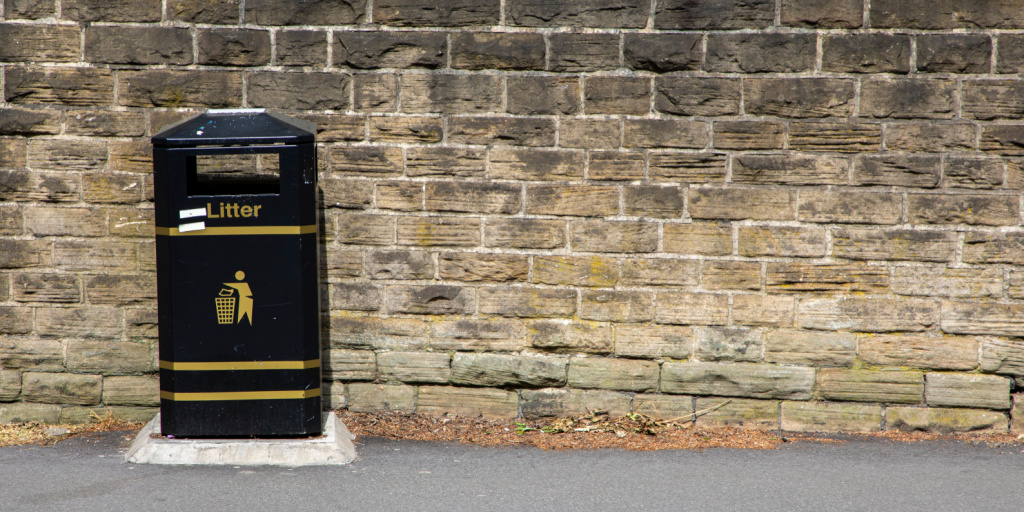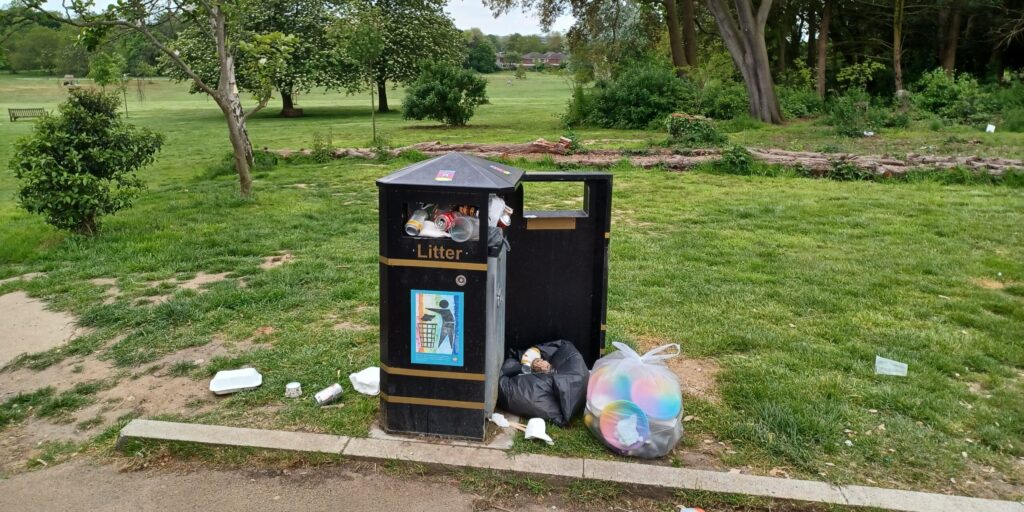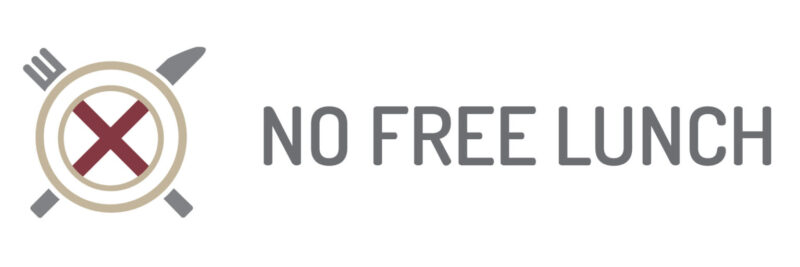
The premise of the Litter Lotto is as simple as it sounds. Pick up litter for the chance to win cash prizes. But what is the impact of using financial incentives to encourage socially beneficial activities?
The Litter Lotto – Should we offer rewards for litter picking?
No matter how many signs tell us to bin our rubbish, a small but significant minority are, for whatever reason, unwilling to comply, even at the risk of being fined. So if the stick doesn’t work, maybe the carrot will. The Litter Lotto rewards rubbish collectors with the chance of winning cash prizes, but should we need to incentivise people to clean up their mess?
Bin It To Win It – How the litter lotto works
Launched in August 2021, the Litter Lotto has already awarded over £300,000 in prizes for the responsible binning of almost 9 million pieces of litter.
To play, you simply download a mobile app, register your details and set off hunting for trash.
When you see a Coke bottle, crisp packet, or one of the 4 trillion cigarette butts discarded a year littering your local streets, you simply need to pick it up and take a photo via the app as you place it in a public bin.
The app records the date, the time and your location, and if it meets Litter Lotto criteria, your submission makes you eligible for a spot prize in LitterLotto coins (the app’s native currency) and earns you entry into a £1,000 weekly lottery, with larger monthly Jackpots of £25k offered on occasion.
On the face of it, this sounds like a win-win arrangement:
- the litter picker gets the chance of rewards in-kind and maybe a nice cash prize for the minor inconvenience of dropping a piece of plastic in a bin, something many people might do for free
- Society at large benefits from a cleaner street, park or waterway
What can you spend your Littercoins on?
In the early days of the Litter Lotto spot prizes were paid in cash, but perhaps as a reflection of the difficulty of sustaining pure cash rewards, a reward scheme was introduced in early 2023 with LitterLotto coins redeemable against a range of prizes:
- Entries into the weekly £1,000 draw
- Name a bin
- Plant trees
- Entry into prize draws
The direction of travel is similar to reward schemes such as Vodafone Rewards, in-kind incentives that are just a different form of advertising for brands eager to connect with the kind of person attracted by gamified litter-picking.
Is the Litter Lotto open to abuse?
Inevitably, where there’s money to be made, you can be certain that someone will try and game the system. So despite some eye-catching marketing slogans, there are inevitable terms and conditions to discourage entries that aren’t in the spirit of genuine litter collection.
For example, there are specific guidelines on what constitutes litter and bulk collection, so don’t rush out snapping photos of yourself dropping hundreds of cigarette butts one at a time.
And you won’t be rewarded for dropping a crisp bag in your kitchen bin either, though the scheme is being expanded to incentivise recycling, with details yet to be announced.
Where do the litter collection prizes come from?
As with any scheme that seems too good to be true, you have to ask about the Litter Lotto business model and where the prize money comes from because we know there’s no such thing as a free lunch.
Entry is free, and the scheme isn’t funded by charity or government, though it collaborates with several English and Scottish councils. It doesn’t make money by selling adverts or your data. Instead, prizes are funded by ’brands who want a cleaner environment’.
Environmentally focused brand partnerships or greenwashing?
The sponsorship approach wouldn’t raise eyebrows until you discover that one of the main sponsors is McDonald’s, who many might feel are part of the litter problem. So is the Litter Lotto facilitating greenwashing, as suggested by a BBC podcast?
The Litter Lotto founder, David Lansberg, says that litter isn’t McDonald’s fault but is their problem. Many might disagree with that argument, but Lansberg’s heart seems to be in the right place, and his project is bringing much need attention to the problem of litter.
Given its unique appeal, the Litter Lotto has attracted attention from the media and boasts tens of thousands of UK users, each binning three pieces of rubbish a day via the app. But can we become a nation of Wombles without cash incentives?
Can the Litter Lotto create habit loops?
The Litter Lotto reward mechanism is designed to create what’s known as a habit loop. Incentivise a progressive activity so that through repetition, it becomes ingrained and the reward component less relevant.
Well, that’s the logic, but any parent will know that bribing their kids into good behaviour is a slippery slope, so how is the Litter Lotto any different?
The Litter Lotto isn’t the first scheme to try and use habit loops to solve persistent social problems. What is known as the Nudge movement gained traction in 2008, following the publication of a book by Cass Sunstein and Richard Thaler ‘Nudge: Improving Decisions about Health, Wealth, and Happiness’.
Nudge Theory uses cleverly designed choice architecture to encourage decision-making in a particular direction without removing an individual’s freedom of choice or sense of control.
President Obama appointed Sunstein the Administrator of the White House Office of Information and Regulatory Affairs from 2009 to 2012.
In 2010, British Prime Minister David Cameron created a Nudge Unit tasked with addressing issues like tax avoidance or the failure of job seekers to turn up at interviews.
Similar nudge experiments were replicated in several other countries, including Australia, Germany, Singapore and Canada, targeting issues such as obesity and dieting.
In 2012, the Danish Nudging Network led by Pelle Hansen, a behavioural philosopher at the University of Southern Denmark, conducted a litter experiment with 1,000 sweets handed out for free.
Hansen and his team monitored all nearby rubbish bins along with any location where a sweet wrapper might be discarded, such as bike baskets, and then repeated the experiment.
There was, however, one key difference. Green footprints were stencilled, leading up to the rubbish bins to nudge people into using the responsible method of disposal.
According to Hansen’s data:
This led to a 46% decrease in the total quantity of littered caramel papers (just under 70% of the original total were unaccounted for in both settings).
CNN, Is a nudge in the right direction all we need to be greener? Feb 2012
As clever as Nudge Theory sounds, it is also problematic. To its critics, there is an element of creepy subliminal coercion that lacks transparency and is open to abuse.
And after more than a decade of widespread application, the results of Nudge-type public policy experiments are inconclusive, as demonstrated by the short-lived nature of what sounds like one of the strangest ever lotteries – the Swedish Speed Camera Lottery.
The Swedish Speed Camera Lottery
The Speed Camera Lottery was tested in one busy street in Stockholm – known for bad driving behaviour – in October 2010 in collaboration with the NTF (the Swedish road transport authority). The Hastighets Lotteriet, as it was locally known, had a first prize of 10,000 SKR, about £750.
The campaign ran until June 2011 with identical trials in Helsingborg, Kalmar, Karlstad, Gävle and Umeå, but despite huge media coverage and reducing average speed by 22% (from 32 to 25kmph) was discontinued.
The main concern with the Speed Camera Lottery was incentivising responsible driving on one stretch of road, left drivers free to put their foot down anywhere else. It’s impossible to know how much of the concern originated from the political optics or the lack of evidence that habit loops can genuinely be built, but the simple fact is the Speed Camera Lottery never caught on.
Kate Raworth’s book Doughnut Economics examines several examples of using financial incentives in social settings and strikes a cautionary tone:
Evidence from a wide range of policy initiatives – from school enrolments to forest conservation – raises a warning signal around introducing cash incentives in social spaces: their deeper effects are so little understood and the evidence to date shows that they can often go wrong
Doughnut Economics, Kate Raworth
What are the alternatives to solve the litter problem?
If you feel that taking money from McDonalds to fund a lottery to reward public litter collection, what are the alternatives?
Rubbish has minimal financial value besides recyclable materials, and in any case, the logistics of providing a collection facility for those sellable items just for the Litter Lotto are impractical.
Bottle returns were phased out in the UK years ago, and a new returns scheme in Scotland, where consumers pay a 20p deposit, has been pushed back to 2025. Drinks manufacturers and retailers have raised concerns about the impact on their trade.
There are some attempts to implement a sustainable recycling economy using blockchain technology, such as Circularr, but whatever the underlying tech, there is no alchemy that extracts financial value from the majority of the rubbish that litters public spaces.
Crypto has tried monetising gaming (Play to Earn) and walking/running (Step to Earn), but evidence to date suggests the economic models are unworkable at best and Ponzi-schemes at worst.

Suppressing the symptoms of a wider problem
Fans of the FIFA World Cup have become familiar with images of Japanese fans staying behind to tidy up the stadiums, so humans don’t have an innate desire to foul their own nest, but the Tragedy of the Commons is more than 50 years old, and we’re still struggling to find ways to counter selfish behaviour.
Education is clearly important and has certainly elevated the wider environmental debate, but even if we can produce meaningful cultural change, minority rule means that even a small section of society can ruin it for everyone else by dropping litter. And one piece of litter attracts another.
The litter problem has more practical issues, such as the availability and emptying of bins, which means that even when citizens want to act responsibly, they can’t, or the design allows foxes to undo responsible binning.
Nudging people to better behaviour through a lottery incentive may reduce litter in those areas offering rewards, but this will likely work only in the short-term to suppress the symptoms of a much wider and more complex problem.
